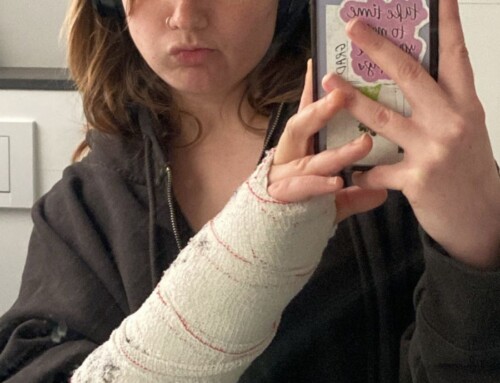By Kylee Cochram (UC Santa Barbara)
With pro tips shared by study abroad advisors
As I prepared for studying abroad, I was so excited for all the new friends, experiences and opportunties. This would be a total shift from the life I was used to, and I couldn’t wait.
I brushed away the warnings about homesickness. That didn’t match my perception—studying abroad is supposed to be the best time of your life!
So, you can imagine my shock when FOMO (fear of missing out) struck me hard those first months abroad. Every time I opened social media and saw all my friends together, I instantly felt like I was missing out. Even seeing posts related to my home university hit me with a pain of regret for leaving for an entire semester.
I kept thinking, “You’re in Europe right now!”
The first few weeks in Europe were filled with meeting so many new people, staying out late, finding my way to class, and exploring my new home. As the days turned to weeks, however, I noticed a yearning for my normal routine. As the time stretched into months, I realized the feeling was not going away.
Let’s be honest, FOMO and homesickness will catch up with you. Along the way, I learned how to manage the lonely feelings and focus on the thrill, excitement, and joy that is study abroad. You can too! Here are my recommendations for managing homesickness on study abroad.
Pro tip: Make the most of your study abroad planning by treating the predeparture webinars like strategy sessions. Students who have gone before you have shared the challenges, which UCEAP study abroad advisors then share with you. Paying attention to their experience can help you avoid the common pitfalls of studying abroad.
Acknowledge what you’re feeling
I read somewhere that there’s no such thing as a negative emotion, and if you want to feel differently, you have to practice thinking differently.
That first one was hard because the feeling felt bad and ugly, but once I acknowledged it and gave it some recognition, the feeling didn’t feel so overwhelming. In fact, it dwindled a bit.
Start by telling yourself, “I’m feeling homesick right now, and that sucks. However, it will pass.”
If I was going to start feeling differently, I needed to think differently. That started with recognizing and appreciating the moments I was having rather than lingering on the ones I wasn’t.
Pro tip: Emotions are like weather – they pass through, but trying to ignore them only creates a bigger mess. Remember, feeling homesick doesn’t mean you’re not having a great experience – it means you have meaningful connections worth missing.
Limit your social media
Let’s be real – social media can be a best friend and worst enemy at home and abroad. Once I noticed social media was the main source of my FOMO, I stayed off the apps for a while, and I recommend you do the same. At the very least, focus on the posts related to your experience abroad, the new friends you are making, and the travel adventures you are having right now.
Remember that while your friends’ photos might look epic, they’re probably scrolling your European adventures thinking, “Wow, I’m missing out on THAT?!”
I found it helpful to set specific social media time. I gave myself 30 minutes in the morning when all my US friends were asleep. That way, it reminded me not to respond and just notice what was happening back home. It was a good balance between feeling completely cut off and worrying that they didn’t think I cared.
Pro tip: Consider starting a ‘Feels vs Reals’ journal where you write down what you’re feeling alongside the reality of your situation. A small, spiral notebook works well with feels on one page and reals on the opposite. Here’s an example: “I feel like I’m missing everything important” on the feel side, and “I’m actively creating once-in-a-lifetime memories in [location].”
Treat your new life like it isn’t temporary
When I looked around for ways to think differently, I noticed that not only was I missing my friends from back home, I was also missing my room. Initially, I approached study abroad with the idea that I didn’t want to waste money decorating a room that I would leave soon, especially since so much of my time would be spent traveling.
That school-issued faded gray comforter, cement flooring and black desk lamp (need I mention the egregiously turquoise-colored walls?) were starting to get me down. The room was quite frankly bleak and so was the time I was spending in it.
That room was neither comforting nor colorful, and it was adding to my feelings of homesickness. The problem was easily fixed with about $50 and a trip to IKEA, which is just as much fun as the American version!
I swapped the bland comforter for a new one in sunshine yellow, added a small funky rug, a vase for flowers and some cute organizers. Postcards from my travels soon covered those awful turquoise walls, and the room I dreaded returning too started too be a place I longed for when I was exhausted from studying and traveling.
Turning my room into a cozy home was the best remedy for my homesickness, and I urge everyone to take the time to turn your space into YOUR space.
Pro tip: Create a home comfort budget before you leave and bring some important things that make your room feel like home. Set aside a small amount of your budget specifically for making your space cozy that first week you’re abroad, and you’ll sleep and study there more comfortably.
Travel often
My last piece of advice is to travel often. Your room should be a place of comfort, but that doesn’t mean you’re stuck there.
Aside from being incredibly fun and liberating, travel breaks up the monotony and reminds you that you are on an adventurous journey. You have plenty of time in your future life when you will be still and not traveling. Now’s the time to go as often as you can.
Planning trips also gives you something to look forward to while you’re working hard on your studies and the time until you go back home starts to feel much shorter when you have a lot of trips planned on your calendar.
For sure, you’re going to get homesick, and it’s important to feel it but don’t wallow in it. With a little effort, you can replace those feeling of homesickness with amazing memories, great friends, and lots of travel stories. The joys of study abroad will outweigh those harder moments, and I promise, when you return home, you may even feel homesick for study abroad.
Pro tip: Join the UCEAP Discord and reach out to students who are living at your location before you leave. They’ll have the best advice for planning one or two simple trips that can be on your calendar before you leave.
Learn more about how to approach planning your study abroad experience as well as managing all the roller-coaster emotions:
- Alex Masci (UC Berkeley) recommends journaling through the experience to achieve personal growth.
- Tanesia Williams (UC Santa Cruz) found acknowledging the stages of study abroad helpful to her understanding the crazy ride of feelings.
- To be prepared for your adventure see the checklist of all the things to learn about your study abroad location before you leave—you won’t be sorry!











Leave A Comment